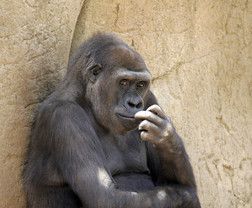Education
Your Inner Monkey: Learning From Your Way-Way-Back Past
Our animal ancestors can teach us much about how we live our lives now.
Posted February 23, 2015

As a psychologist who specializes in couples therapy, I am always seeking new ways to understand why my clients do what they do, and how to help them get on more positive pathways. Interestingly, one of the PT bloggers whose posts and books have offered me particularly helpful new ideas writes from the perspective, not of a psychologist in academia or in clinical work, but of a docent at the Oakland Zoo.
When blogger Loretta Breuning explores what we can learn by looking at our past, she's not thinking of the past of decades, generations or even centuries ago. Breuning studies what we were like before we became homo sapiens. Freud went back to look at events in childhood to understand adult emotional states and struggles. Breuning goes back far further, back to our mammal ancestors, to learn how and why we make friends, cooperate, become anxious or depressed, fight and more.
Breuning’s learning from the way-back past brings to light many key insights. Here’s a few:
1. In her book Meet Your Happy Chemicals Breuning points out that animals are very smart, yet without words. How do animals make the good decisions that enable them to hunt for food, find shelter, form attachments and reproduce successfully if they can’t even say “hello” to each other, never mind share information, thoughts or ideas? It’s all about chemicals, Breuning says, and especially from the “happy chemicals.”
Like monkeys, we do more of what elicits the feel-good body chemistry of dopamine, serotonin, oxytocin and the like. What elicits these happy chemicals? Three big patterns include: striving toward a goal (dopamine), feeling bigger or stronger and higher on the pecking order than others (serotonin), connecting in loving ways, like through touch or eye contact (oxytocin), which then leads to trust increases and eventually to the flow of sexual chemistry and reproduction.
2. In I, Mammal Breuning continues to explore how our mammal natures influence what we do in our human lives. She writes, for instance,
"Nature is not as happy as you think. Mammals struggle to relieve their hunger and their food is often snatched from them by others. They see their offspring eaten alive by predators and must face the predator again tomorrow. Mammals work hard for any mating opportunity that comes their way, which is often none. Life is not all warm and fuzzy in a herd or pack or troop…
"The weaker members of an animal herd live around the edges where predator threat is highest. They are not sacrificing themselves voluntarily. They have spent their lives pushing toward the center as herd animals do, but when they are too weak to prevail they end up on the edge." (from Breuning’s informative website, innermammalinstitute.org)
3. Beyond Cynical, Breuning’s latest book, addresses the human tendency to look at what’s wrong…in others, in the world, maybe even in ourselves. While sometimes seeing what’s problematic can lead to constructive problem-solving, often focusing on negatives instead builds a habit of cynicism.
Cynicism, an “ain’t it awful” perspective, feels good because it feels familiar, but Breuning asks, does it lead to more happiness? Or is it a mistaken turn of mind that , when ceased, opens up more joy and well-being?
Breuning explains how, because of our mammalian nature, a wrong turn down the road to cynicism toward a chronic “ain’t it awful” stance can feel like happiness, yet actually drags you down.
Want to learn from your way-back past?
I do recommend that you check out for yourself how your mammal ancestry may be leading you astray. See Breuning’s books, her PT blog, and also, just released, her dealightfully informative website to look and learn from your past in a whole new way.
-------------
Susan Heitler, Ph.D., a Denver clinical psychologist, is the author of From Conflict to Resolution on psychotherapy and The Power of Two on the secrets to marriage success. A graduate of Harvard and NYU, Dr. Heitler's latest project is the online marriage-skills program PowerOfTwoMarriage.


